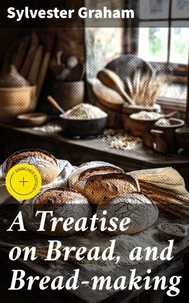A Treatise on Bread, and Bread - making
Par :Formats :
Disponible dans votre compte client Decitre ou Furet du Nord dès validation de votre commande. Le format ePub est :
- Compatible avec une lecture sur My Vivlio (smartphone, tablette, ordinateur)
- Compatible avec une lecture sur liseuses Vivlio
- Pour les liseuses autres que Vivlio, vous devez utiliser le logiciel Adobe Digital Edition. Non compatible avec la lecture sur les liseuses Kindle, Remarkable et Sony
 , qui est-ce ?
, qui est-ce ?Notre partenaire de plateforme de lecture numérique où vous retrouverez l'ensemble de vos ebooks gratuitement
Pour en savoir plus sur nos ebooks, consultez notre aide en ligne ici
- Nombre de pages63
- FormatePub
- ISBN859-65--4772873-3
- EAN8596547728733
- Date de parution21/11/2023
- Protection num.Digital Watermarking
- Taille775 Ko
- Infos supplémentairesepub
- ÉditeurDIGICAT
Résumé
In "A Treatise on Bread, and Bread-making, " Sylvester Graham presents a compelling exploration of the essential role of bread in human nutrition and health. This seminal work delves into the art and science of bread-making, advocating for the use of whole grains and natural ingredients as a means to promote vitality. Graham's writing embodies the transcendentalist literary style, blending scientific investigation with philosophical musings on health and well-being, which positions the text within the 19th-century social reform movement aiming to enhance dietary practices through moral and health-conscious living.
Sylvester Graham, a prominent figure in the antebellum health reform movement, was informed by a combination of his medical training and personal convictions regarding dietary reform. Known as the father of the vegetarian movement in America, Graham championed a holistic approach to health, seeing links between diet, morality, and physical wellness. His beliefs were deeply rooted in the notion that proper eating can lead to spiritual improvement, which undoubtedly shaped the content and purpose of this treatise, aiming to educate the public on the merits of a nourishing diet.
Readers interested in the intersections of nutrition, health, and social reform will find "A Treatise on Bread, and Bread-making" not only informative but inspirational. Graham's passionate philosophy on food choices serves as a precursor to contemporary discussions on natural diets and sustainable eating practices, making this work relevant even today.
Sylvester Graham, a prominent figure in the antebellum health reform movement, was informed by a combination of his medical training and personal convictions regarding dietary reform. Known as the father of the vegetarian movement in America, Graham championed a holistic approach to health, seeing links between diet, morality, and physical wellness. His beliefs were deeply rooted in the notion that proper eating can lead to spiritual improvement, which undoubtedly shaped the content and purpose of this treatise, aiming to educate the public on the merits of a nourishing diet.
Readers interested in the intersections of nutrition, health, and social reform will find "A Treatise on Bread, and Bread-making" not only informative but inspirational. Graham's passionate philosophy on food choices serves as a precursor to contemporary discussions on natural diets and sustainable eating practices, making this work relevant even today.
In "A Treatise on Bread, and Bread-making, " Sylvester Graham presents a compelling exploration of the essential role of bread in human nutrition and health. This seminal work delves into the art and science of bread-making, advocating for the use of whole grains and natural ingredients as a means to promote vitality. Graham's writing embodies the transcendentalist literary style, blending scientific investigation with philosophical musings on health and well-being, which positions the text within the 19th-century social reform movement aiming to enhance dietary practices through moral and health-conscious living.
Sylvester Graham, a prominent figure in the antebellum health reform movement, was informed by a combination of his medical training and personal convictions regarding dietary reform. Known as the father of the vegetarian movement in America, Graham championed a holistic approach to health, seeing links between diet, morality, and physical wellness. His beliefs were deeply rooted in the notion that proper eating can lead to spiritual improvement, which undoubtedly shaped the content and purpose of this treatise, aiming to educate the public on the merits of a nourishing diet.
Readers interested in the intersections of nutrition, health, and social reform will find "A Treatise on Bread, and Bread-making" not only informative but inspirational. Graham's passionate philosophy on food choices serves as a precursor to contemporary discussions on natural diets and sustainable eating practices, making this work relevant even today.
Sylvester Graham, a prominent figure in the antebellum health reform movement, was informed by a combination of his medical training and personal convictions regarding dietary reform. Known as the father of the vegetarian movement in America, Graham championed a holistic approach to health, seeing links between diet, morality, and physical wellness. His beliefs were deeply rooted in the notion that proper eating can lead to spiritual improvement, which undoubtedly shaped the content and purpose of this treatise, aiming to educate the public on the merits of a nourishing diet.
Readers interested in the intersections of nutrition, health, and social reform will find "A Treatise on Bread, and Bread-making" not only informative but inspirational. Graham's passionate philosophy on food choices serves as a precursor to contemporary discussions on natural diets and sustainable eating practices, making this work relevant even today.


